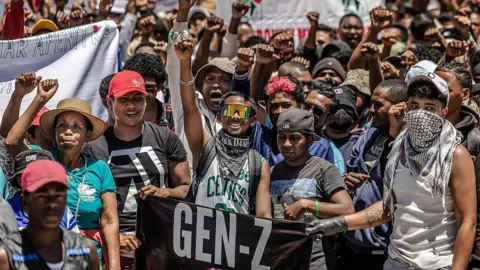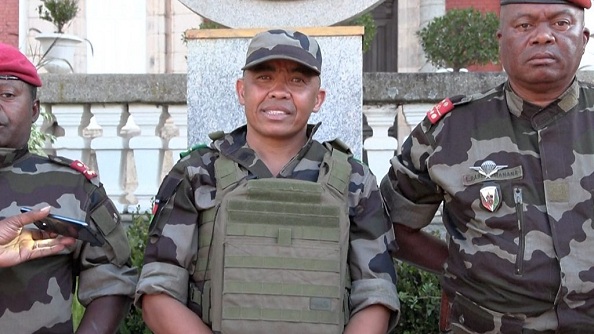An elite military unit says it has seized power in Madagascar from President Andry Rajoelina following weeks of youth-led protests in the Indian Ocean island.
Standing outside the presidential palace on Tuesday, Capsat chief Col Michael Randrianirina said the military would form a government and hold elections within two years. He also suspended key democratic institutions, like the electoral commission.
Gen Z protestors will be part of the changes because "the movement was created in the streets so we have to respect their demands" he added.
Troops and protesters have been celebrating the apparent ousting of President Rajoelina, with thousands waving flags in the capital, Antananarivo.
Capsat stands for Personnel Administration and Technical and Administrative Services Corps, and is the most powerful military unit in Madagascar.
The unit supported Rajoelina when he came into power in 2009, but joined the protesters on Saturday.
Madagascar's constitutional court has named Col Randrianirina as the country's new leader, even though a statement from the president's office said he was still in charge and denounced what it described as an "attempted coup d'etat".
Rajoelina's whereabouts are unknown, but he has said he is sheltering in a "safe place" following an alleged attempt on his life by "military personnel and politicians". Capsat has denied any involvement in any such move.
There have been unconfirmed reports that the president was flown out of the country on a French military aircraft.
Also on Tuesday the US state spartment urged all sides "to pursue a peaceful solution in line with the constitutional order".
Col Randrianirina told the BBC that Madagascar was "a country where chaos reigns right now".
"Chaos because there's no president - he's gone abroad."
The unrest began just over two weeks ago, after a youth-led movement began protesting against chronic water and power cuts across the country.
 AFP via Getty Images
AFP via Getty Images
The demonstrations soon escalated, to reflect wider dissatisfaction with Rajoelina's government over high unemployment, rampant corruption and the cost-of-living crisis.
Protestors clashed with security forces resulting in the death of at least 22 people and more than 100 others injured, according to the UN, although the Malagasy government has dismissed those figures and described them as based on "rumours and misinformation".
President Rajoelina, an entrepreneur and former DJ, was once seen as a fresh start for Madagascar.
The baby-faced leader became president when he was just 34, earning the title of Africa's youngest leader, and going on to govern for four years, before returning to power after the 2018 election.
But he fell out of favour following allegations of cronyism and corruption, which he denied.
Despite the fact that power appears to have shifted away from him, he has continued to try to influence events.
Rajoelina attempted to dissolve the national assembly before the opposition could vote to strip him of his presidency for abandonment of post, but that didn't work.
Lawmakers voted to impeach Rajoelina by 130 votes to one blank ballot on Tuesday. Even members of his party, Irmar, voted overwhelmingly to impeach him.
Rajoelina rejected the vote, calling it "null and void".
The African Union (AU) has warned against soldiers "meddling" in Madagascar's political affairs and rejected "any attempt at unconstitutional changes of government".
French President Emmanuel Macron called the situation "greatly worrying".
The island has gone through a series of political upheavals in recent years.
Madagascar is one of the poorest countries in the world, with 75% of its 30 million people living below the poverty line, according to the World Bank.
BBC





